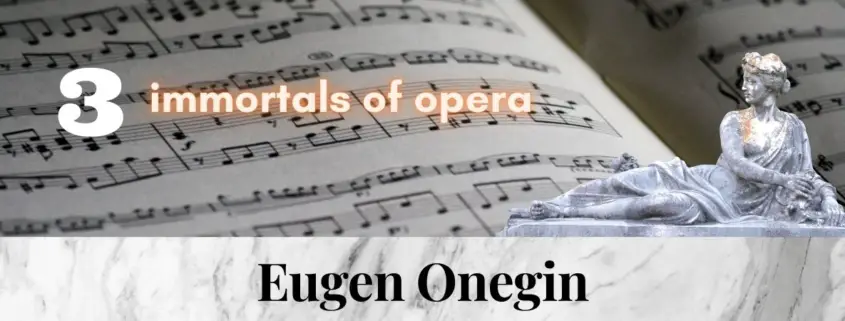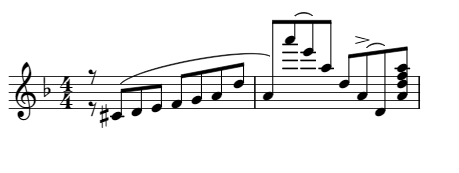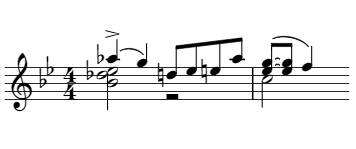Tchaikovsky wrote ten operas and Eugene Onegin is his most famous and beautiful. Emotive music, dazzling orchestration and inner drama characterize this work. In addition, Tchaikovsky gives us beautiful, musical orchestral passages reminiscent of his most beautiful ballets.
Tatyana’s letter scene – she has fallen in love
Tatyana went for a walk with Onegin, she felt strangely attracted to him, while Onegin walked coolly beside her. In the evening in her room, she cannot fall asleep. The sensitive Tatyana has become aware that she has fallen in love with Onegin. She sits down at her desk and writes Onegin a rapturous love letter. That very morning, she has it delivered to Onegin.
The letter scene is one of the great monologues in opera history. Tatyana goes through all emotional states in this famous scene. From hopelessly desperate to ecstatic high spirits. The monologue is divided into four sections, each of which could stand alone.
We learn about four important memory motifs in this epistolary scene. The introduction describes Tatyana’s ardent longing. The vibrant tremolo of the strings reflects inner turmoil and discord. The change in the orchestral introduction to rapid sixteenth notes with plucked eighth notes of agitated heartbeat imitate her agitation over whether to write the letter. Soon Tatyana sets in with her resolution, “Puskai pogibnu y” (“And if it were my end”). The singing becomes more feverish, rising in waves to the high A flat and ending with the decision to sit down at the desk immediately “vezdy, on predo mnoyu!”. As the singer sits down at the desk, she falls silent, the orchestra calms down and begins a new introduction, this time quiet. Tatyana’s leitmotif is audible in the strings:
Tatyana picks up the pen, but after a few beats she falters, what should she write? Onegin’s motif appears, sung tenderly several times in the oboe:
But she hesitates, “ne v silakh ya vladyet svoyei dushoi!” (“I don’t have the strength to force my heart”). What is the alternative? Tchaikovsky quotes Tatyana’s loneliness motif in the flutes:
With Onegin’s motive in the orchestra, she begins to write (“zachem vi posetili nas?”, “why did you come to us? “), she reveals everything. She writes the confession to her anguish of soul. Tchaikovsky increases the tempo more and more, the music becomes more and more urgent. Then the mood changes abruptly as the oboe sings the confession of love motif:
Tatyana takes up the motif hesitantly and tenderly at first: “Kto ti: moi angel li khranitel” (“Who are you? My guardian angel or a cunning tempter?”). The fear of rejection is great, but she wants to try. As she signs the letter, glorious brass and jubilant strings sound, and Tatyana ends the aria with trembling words.
Anna Netrebko’s letter scene is simply magnificent. She masters the intimate parts of this piece, her singing is subtle, the piani are breathtaking, only to produce ecstatic top notes a little later in great fervor from her full throat.
Puskai pogibnu ya – Netrebko
Lenski’s great aria Kuda, kuda
The morning of the duel dawns. Lensky stands in a desolate snowy landscape. As he waits for Onegin, his thoughts drift back in deathly foreboding to his past youth and his love for Olga.
The melancholy “Kuda, Kuda” became a show piece of many tenors. You can hear four versions in the playlist.
You will get an impression of a classical Russian tenor in an amazingly good sound quality (recording year 1912) with the voice of perhaps the best Russian tenor, Leonid Sobinov of this piece called “Lenski’s Aria”. Russian tenors sound somewhat unusual to Western ears. They have a high timbre, sound very elegiac and are able to sing beautiful lines. But they are not so rich in color and sometimes sound a bit lean (Kesting).
Kuda, kuda vy (Lensky’s Aria) – Sobinov
The tragic finale
In the morning at Gremin’s house. Tatyana has received a letter from Onegin, who is about to appear. Tatyana remembers well when 2 years ago Onegin dismissed her with a cold-hearted sermon. Happiness was so close, but now she is married and asks Onegin to leave. Onegin refuses. The moved Tatyana confesses his love to him. But her loyalty belongs to her husband. Onegin does not want to accept this, but Tatyana rejects him and leaves the room. Onegin leaves the house in a hurry.
We hear an excerpt of this scene from a gala concert by Anna Netrebko and Dmitri Hvorostovsky in Moscow’s Red Square.
O! Kak mne tiazhelo – Netrebko/Hvorostovsky











Leave a Reply
Want to join the discussion?Feel free to contribute!